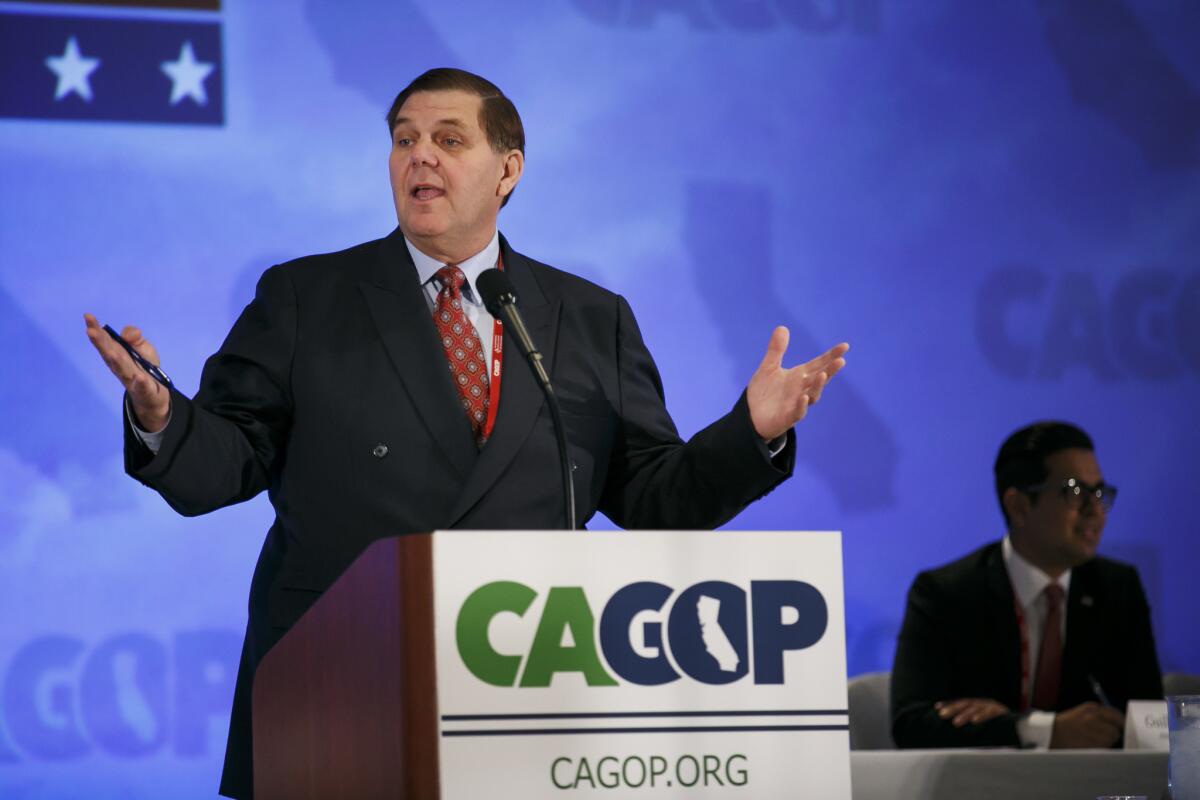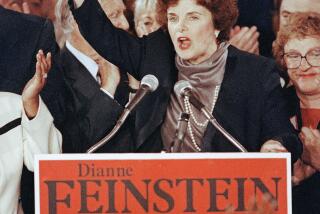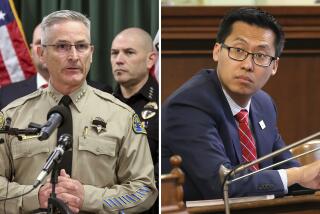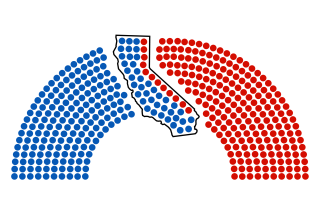Can the California Republican Party bounce back in 2018? Here’s the chairman’s game plan

Jim Brulte hopes to keep a job few would envy: As chairman of the California Republican Party, he’s tasked with trying to steer his party out of the wilderness in one of the bluest states in the nation.
As the party looks ahead to a high-stakes governor’s race and midterm elections in 2018, it faces a grim reality: A Republican hasn’t been elected to statewide office here in more than a decade, and the Democrats hold a powerful supermajority in the state Legislature. The GOP’s share of registered voters in California is just 27.3%, its lowest since 1980, and it has yet to field a prominent candidate in the 2018 governor’s race.
Brulte vows that the party’s fortunes will improve in the 2018 election, including one or two top-shelf candidates running for governor. He’ll make his case in Sacramento this weekend at the California Republican Party’s three-day convention, where GOP delegates banking on Brulte to deliver are expected to vote Sunday in favor of extending his reign as chairman for a third term.
Donald Trump’s election provides an opening, Brulte said. California’s Democratic leadership is so focused on battling the new Trump administration that they are ignoring growing concerns at home, he said. The state’s roads, bridges and dams have fallen into disrepair, poverty is on the rise, middle-class families struggle to afford a decent home and massive pension liabilities still loom — all problems that have festered under the watch of Democratic Gov. Jerry Brown and the Democratic-controlled state Legislature, Brulte and other state Republican leaders said.
“We are looking for opportunities where Democrats are out of step with the districts they represent because they are bowing down to a liberal Washington Democrat establishment that is fundamentally out of touch with where the country is, and where California is,” Brulte said in a recent interview.
The difficulty will be convincing Californians that Republicans have the answers, especially as GOP leaders in Washington dismantle the Affordable Care Act, crack down on immigrants in the country illegally and strip away environmental protections — moves that are popular with a conservative base, but don’t play well out west.
“The first step is honestly acknowledging that the Republican brand is fractured,” said Stanislaus County Supervisor Kristin Olsen, vice chairwoman of the state party. “Then it’s taking clear steps to improve that brand, to tell people that we as California Republicans care about their daily struggles with healthcare, immigration policies, schools and economic opportunities.”
GOP leaders have seen the 2018 election as a potential Republican spring, a time when years of hard work helping Republicans win seats on city councils, county commissions and local school boards would begin to bear fruit in bigger races.
Despite their low numbers in Sacramento and California’s congressional delegation, Republicans have done well in local government races. As of earlier this year, Republicans accounted for 42% of elected city officeholders in California and Democrats accounted for 46%, according to data compiled by political consulting firm GrassrootsLab. In the California Legislature, Republicans account for 32% of lawmakers and Democrats account for 68%.
Posts on city councils and county boards are nonpartisan. Candidates running for the Legislature, Congress and statewide office have their political party listed on the ballot, and that can be a major obstacle in a deep-blue state.
Republican political consultant Matt Rexroad, who is a Yolo County supervisor and represents a Democratic-leaning district, said local government elections favor candidates with deep roots in their communities. Voters tend to back people they know.
“They’re largely student body president contests,” Rexroad said of local elections. “People are far more likely to trust the PTA president … than somebody running on a pure policy agenda.”
Former Rancho Cucamonga City Councilman Marc Steinorth parlayed his local political success into a seat in the California Assembly, an example of the bottom-up political strategy championed by Brulte. Steinorth, who owned an advertising firm and a string of pizza parlors in his community, campaigned door-to-door on issues such as job creation, affordable housing and cutting through government bureaucracy. He’s won two straight Assembly elections in a district that includes San Bernardino and Redlands and where Democrats had a 7-percentage-point edge in voter registration as of November.
“I think that it’s easy for us to define everything based on party lines when we’re talking about the national level…. But when we’re dealing with issues on a very local level, it really comes down to where are you on the policies,” Steinorth said. “Where are you on the issues, and are you caring about your community.”
Despite Steinorth’s success, making the leap from city council to the Legislature or Congress has proven to be difficult for Republicans in all but the most deep-red parts of the state.
Brulte admits it could take time for the party’s local strategy to pay off.
“The Republican Party in California did not get in trouble in one election,” Brulte said. “It has been a multi-decade decline, and it’s going to take more than one or two elections for us to climb back.”
It will be a steep climb if they do. For the first time in 2014, more voters in California were registered as nonpartisans or with third parties than as Republicans.
Republican political consultant Steve Schmidt said the GOP’s declining voter registration numbers in California spell doom for the party’s future prospects in the state.
“Institutionally, it’s a third-party entity,” said Schmidt, who worked for President George W. Bush’s 2004 reelection campaign and helped run the 2008 presidential campaign of Republican Sen. John McCain. “You’ll see an independent candidate elected [governor] before you see a Republican elected again.”
If that happens, it won’t be for Republicans’ lack of trying, Brulte said. The party’s No. 1 priority in 2018 is to elect a Republican governor, he said.
“We believe there will be one or two very strong candidates on our side,” Brulte added, but he declined to say whom they might be. “We’ve spent a significant amount of money seeing if there is a path for a Republican to win statewide, and we believe there is.”
NEWSLETTER: Get the best from our political teams delivered daily »
The path to victory could depend on finding a Republican candidate who can coalesce GOP support and appeal to independents and moderates. That person must also survive a primary election battle against the Democratic heavyweights already in the race, including Lt. Gov. Gavin Newsom, former Los Angeles Mayor Antonio Villaraigosa and state Treasurer John Chiang.
So far no well-known Republicans have stepped forward to run for California’s top post. San Diego Mayor Kevin Faulconer, thought by many to be the GOP’s best shot at the office, has said repeatedly that he won’t run. Ashley Swearengin, the former Fresno mayor who lost her bid for state controller in 2014, has also said she’s not interested.
“If you don’t field credible and competitive statewide candidates, for some of the offices at least, I think the voters start to take that as a concession. And that’s a dangerous place to be in the minds of the electorate,” said Rob Stutzman, a Republican strategist and former spokesman for Gov. Arnold Schwarzenegger.
There’s also a series of potential obstacles for Republicans that has sprung out of Trump’s victory. Experts say the Trump White House could distract California Democrats from pressing battles back home, but it could also energize the progressive resistance enough to deter Republican candidates and donors.
And with Trump now the leader of the national party, it could be more difficult for GOP members of Congress to distance themselves from the president, as many California Republicans did in the November election.
Progressive activists have showed up at the district offices of Republican members of Congress to protest votes on Trump’s cabinet appointments and plans to repeal the Affordable Care Act. If the liberal uprising lasts, it could knock Republicans off kilter.
Whatever Trump’s impact on California Republicans, it’s unlikely to be direct, said Tammy Frisby, a research fellow at Stanford University’s Hoover Institution. Republicans running for statewide and legislative offices should have no problem distancing themselves from the president, Frisby adds, but having Trump in the White House could be dangerous for them if either side feels that the president’s policies could leave California Republicans vulnerable in 2018.
“Whether a ‘Trump problem’ for California Republicans is real or not, it could be a self-fulfilling prophecy if good candidates don’t run and big donors don’t give,” she said.
Mike Osborn, chairman of the Ventura County Republican Party, believes that Trump’s election may actually work to the advantage of California Republicans. With the Democratic Party so focused on the Trump administration, and the need to protect Democratic U.S. senators up for reelection in 2018, the GOP could land some significant victories, he said.
“I think it’s going to be pulling a lot of big [Democratic] money out of California,” Osborn said.
In the early days of Trump’s presidency, as Democratic leaders across the state focused on the White House, top Republicans have done anything but. Last week, it appeared, the Democrats began to take notice.
“I’m tired of talking about Donald Trump,” Assembly Speaker Anthony Rendon (D-Paramount) told a gathering of California newspaper publishers. “If Hillary Clinton had gotten elected president of the United States, we would have started the year with 2.5 million children in California living in poverty. If Hillary Clinton had been elected president of the United States, we would have started the year with crumbling roads.”
Mike Madrid, a Sacramento Republican consultant, quickly seized on Rendon’s comments, congratulating Assembly GOP Leader Chad Mayes for “forcing” Democrats to “finally address poverty in California.”
Mayes’ response was one that state Republicans are likely to keep in their back pocket as they attempt to win back their stature in the Golden State: “I’m thankful we’re going to focus on the problems right here in [California].”
For more on California politics, follow @philwillon and @cmaiduc.
ALSO
After decades of Republican victories, here’s how California became a blue state again
Noisy town hall protests show how the left is trying out tea party tactics to fight Trump
California Republicans ask Trump administration to block bullet train funding
Updates on California politics
More to Read
Get the L.A. Times Politics newsletter
Deeply reported insights into legislation, politics and policy from Sacramento, Washington and beyond. In your inbox three times per week.
You may occasionally receive promotional content from the Los Angeles Times.








